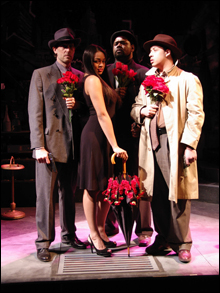Rhyme ’n’ crimeProvidence Black Rep’s Black Maria February 13,
2007 5:35:15 PM

THE LANGUAGE: is figurative rather than concentrated.
|
For the centerpiece production of its 10th anniversary season, the Providence Black Repertory Company figured it would do something completely different. While theaters have been translating novels to the stage ever since playwrights started ranging past their own experiences, artistic director Donald W. King decided to adapt and direct a book of poetry, Kevin Young’s Black Maria: Being the Adventures of Delilah Redbone & A.K.A. Jones (through March 11).
Don’t worry, there’s a loose narrative thread holding it all together. And the poems are clear on a single hearing, using figurative rather than concentrated language. (“As she said ‘I loves you,’ there was nothing I could do. Sometimes you gotta let it rain, forget you might melt. . . .”)
If that’s not enough to ease the assimilation, the loose story is stylized as a film noir tale, with the accent on noir. The black detective in the Chester Himes tradition is introduced as A.K.A. Jones (Aaron Andrade), which lets us know that a wise-cracking tone will leaven the obligatory gritty realism of the genre. The shadowy set by Kyla Coburn, who also did the retro costumes, contains a real fire hydrant and streetlamp as well as an evocatively abstract black-and-white background; it’s helped a lot in moody moments, which are frequent, by David Roy’s lighting design. There is some original music by sound designer Nathan Leigh, mostly brief, jazzy recorded scene transitions.
The femme fatale is Delilah Redbone (Alexis Brown), who says things like “When I walk by, women get religion, pray I’ll go away.” She’s a kid from the countryside, where she “auditioned for the locusts and mockingbirds,” got tired of dancing to the radio and came to Shadowtown to make it big in the movies. She meets a director who “taught me to cry on cue, and now that’s all I do.” That old cautionary tale. Since the life lesson isn’t new, what we are offered are colorful characters and just enough humorous touches to not deflate the pathos. There is a sullen pre-gangsta gangster known only as the Boss (Raidge), and a multifunctional urban denizen billed as the Naked City (Bob Jaffe) who plays numerous characters, such as a cop who faces off with Jones several times, their guns drawn to heighten tension.
Such a setup risks taking itself too seriously, but here the danger is usually deflected by such lines as “[You] start with a happiness that only serious drinking can cure,” from a poem titled “Dress Code.” The tradition of hard boozing is as important as loose women in such a setting, which inspired the audience’s favorite line of the evening, when Jones says, “I drink a lot about my thinking problem.” In a related attitude, a sign on his empty office door reads: “Gone Wishin’.”
Although Delilah is fated for failure, the star of the evening is Brown as she brings her to life, knowing when to lighten a grim mood with humor so that we’re watching teary scenes from a multi-dimensional, if stereotypical, character. Director King modulates the emotions in most of the interactions this way, shaping what could be just a choppy series of vignettes. After all, this is more a bluesy mood piece than an African-American Spoon River Anthology. Young helps Delilah come more convincingly to life than the others here, natural with lines such as, during a hotel tryst with Jones: “I didn’t care — pulled the pins like a grenade’s from my hair and let the flowers wilt behind my ear.” Even if Brown didn’t have the beautiful singing voice she does, her honesty as an actor — and this, remarkably, is her stage debut — would make this performance worthwhile.
A gumshoe scuffing along is more difficult to lift out of cardboard caricature, given the genre tradition of tough guys not looking at themselves ironically. But Andrade does a good job with what he’s given, not dulling the edge of Jones’s earnest self-pity. He strikes just the right note of confidence mixed with anxiety when the detective, hoping to see Delilah, shows up at a masquerade ball “disguised as myself, and no one recognized me.”
Poet Kevin Young wrote Black Maria as the fourth of his five volumes of poetry to date. The latest, For the Confederate Dead, was published last month and deals with the consequences of slavery on African-Americans in the South, and his earlier Jelly Roll was a finalist for the National Book Award. A Brown University MFA graduate in creative writing, he currently teaches at Emory University.
|
 |

|
- In The Edge of Disaster, a security expert warns that the US is not prepared for future disasters
- Never mind its tough-girl alt-porn feminism: SuicideGirls has already moved on to a new generation
- Lesson One: the perils of sharing
- Oral is the new second base, the “mostly” girls keep on kissing girls, and the Bro Job has arrived (but is still not ready for its close-up)
- How one little post-war doughnut shop became synonymous with Boston’s identity
- Few on Deval Patrick's ‘fresh blood’ staff have been seasoned in the State-house hallways
- How one little post-war doughnut shop became synonymous with Boston’s identity
- Who’s looking at you, kid?
- SexyFront
- Last year’s New Times–Village Voice media merger pitted two kinds of journalism against each other. Guess who won?
- The abiding lessons of civil-rights-movement-era journalism
- Veteran New York editor Lance Gould to helm the weekly
|
-
Brown's Pulp Uncovered festival
-
Detritus and Crenca's energetic collaboration
-
Trinity Rep's splendid A Delicate Balance
-
Housing crunch
-
The Rhode Island Writers’ Circle Anthology
-
Perishable’s probing Constitutional
-
Viva las ropas viejas
-
2nd Story’s madcap Flea In Her Ear
-
Brews, ballgames, and much more
|
|